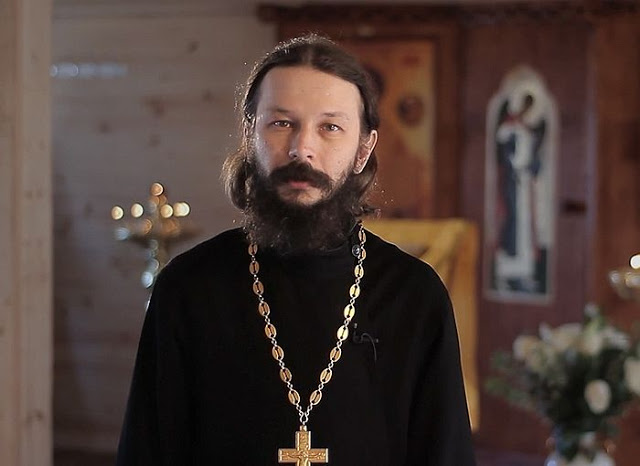
Archpriest Paul Gumerov speaks about what is most important in family life, which rules are necessary to obey to live long and happily, and what to follow and what to avoid.
I greet you, dear readers! Today we will be speaking directly on what is family life and how to fine-tune it, to paraphrase the famous words of St. Theophan the Recluse.
The purpose of the Christian life generally, and of family life in particular is to serve God and to serve your loved ones, and this is a task of paramount importance. All that we do, as the Apostle Paul writes: Whether therefore ye eat, or drink, or whatsoever ye do, do all to the glory of God (1 Cor. 10:31). And all can be considered from the point of view of the salvation of our souls and from the point of view of service to God and to our loved ones, and family life has the same main task.
Very often we see such a picture: when people for some reason can’t develop a family life or they don’t really want to do it, they give all their unspent love and desire to serve other people to various social projects: they take up volunteering, visiting hospices and cancer wards, helping the homeless at the railway stations … It’s all very good if your family life doesn’t suffer from it, because you must first put your own home in order, help your family and loved ones, and then you’ll be able to help others. As the Apostle Paul says in his letter to Timothy: But if any provide not for his own, and specially for those of his own house, he hath denied the faith (1 Tim. 5:8).
Today I would like to speak about a few principles which I employ in my personal family life and which I advise to people who come to me, as components for building a happy Christian marriage.
 |
| Archpriest Paul Gumerov |
Here are the principles. First I’ll name them and then I’ll explain each one:
1) Never forget what is most important.
2) Your family is you.
3) Try to communicate more.
4) Discuss vital problems, communicate.
5) Respect one another.
6) Don’t try to remake or re-educate your other half, but be able to see the good, bright side in your beloved and in your family life.
7) Give no place to anger and other negative emotions.
8) Do more to please your family.
9) Give help and mutual assistance.
And now on each of these points in more detail:
Never forget what is most important
A person often strives for different goals in his life: career, creativity, a family… There are especially many issues that should be resolved in the first year of spousal life (we spoke about it in one of our previous talks). The first year of marriage is quite difficult: we have to settle some material problems, develop relationships with relatives, find an apartment, then follows the birth of your first child and so on and so on. Of course, at first people don’t have experience with any of this, which comes with the years. And in this commotion it often happens, as they say, that we “throw the baby out with the bathwater,” that is, to forget about the most important thing: why we united ourselves into a family. And why did we? To love one another, to rejoice, to serve one another. We should especially remember this in difficult circumstances. We joined into a family not at all in order to prove who is right, who is to blame, or to solve some problems immediately: we want it today, we want it now. Of course, we won’t be able to solve everything immediately. And with any problem or family conflict we must always give room for the most important thing and pursue it.
Our family is us
Whether we like it or not, our spiritual wellbeing, and physical too, depends now on who is near us. I will speak about myself: at a certain point I stopped separating myself from my family, in general: I had the feeling that I had always had a wife and children, and they were even always of the same age as now. It was somehow forgotten that there was a period where I was unmarried, when I had no one near me that I cared for.
Being a family man, you must align the orientation of your soul and all your actions with other people—it is very important—to try so that everything is good not just for you, or not just for someone else, because if something is bad for you, you will reconcile yourself to it, and do so endlessly, and in the end you won’t be able to endure it and you’ll explode; or you will habituate someone else to dependence, or maybe even to tyranny…
In family life we must forget the pronoun “I” and remember the pronoun “we.” This refers both to minor issues and to those more important. Everything must be spoken about and discussed.

Try to communicate more
In one American university, if I’m not mistaken, they did some research to determine why marriages fall apart, and it turns out that the majority of marriages break up not from infidelity, not because people have different personalities, not from economic problems, but from a lack of communication between the spouses! People don’t find this unity which is so necessary in marriage. It probably was there at first, but then somehow got lost, or always, even before marriage, the partners barely spoke with one another… He and she begin to live their own lives, and it’s very grievous when people don’t perceive their family as “we.”
It sometimes happens: some kind of “crack” in the relationship appears and begins to grow, but they don’t want to get a divorce, and there are already children and they live under one roof essentially as two people, strangers to one another, to each his own life, one not interested in the other… Once a woman complained to me that she and her husband had nothing left in common (they were already middle-aged) except joint housing and children. I began to question her about what and how. She told me that her husband is unchurched, with his own secular interests, and she is a practicing Orthodox. I asked what kind of music he likes, which books, and in general what kinds of hobbies he has. “He listens to Boris Grebenschikov.” And I said: “Then you should go with him to a Grebenschikov concert. What’s the big deal?” “How’s that? No. Why would I go to a concert?!” You understand, this person doesn’t want to make any steps towards the other! And it’s quite sad.
A common occurrence: spouses spend their vacations separately—she goes to a resort with the kids, and he, for example, goes to their summer house or somewhere else… I know very many couples who began to live this way—every man for himself. They were united simply at some point to quickly start a family and have kids… It’s even happened that they begin to live in separate apartments. Of course, such a disconnection doesn’t appear immediately, and, thank God, if the people realize it in time, they can recover their family unity—communicating with one another. But for this you must make an effort!
My grandfather and grandmother gave me an example of a nearly ideal family life. They were already quite old but they were strong for seventy. Visiting them in Ufa, my native city, I was always amazed that these people, who it would seem already exhausted every topic, whose children were grown, whose grandchildren were already married, were so interested in one another. Grandpa would return from the garden and begin to tell Grandma something. They spent hours talking about the day’s events! I was amazed at how they could discuss something! Was it about the news that they saw on TV? Not at all. They found one another more interesting.
I recall one batiushka who was always very caring for his matushka, and even when he stayed to sleep in the church house between services, he always took the phone to call her and ask: “How are you? How are you feeling?” He gave her such attention, such gentle care, like we usually see in young people.
Neglecting communication is forbidden, because in communication is born community—that community which is binding and cementing in the beginning of marriage, for lack of which, as researchers say, marriages break up.
After a hard day, when the kids have already gone to bed, discuss the day’s events with your spouse over a cup of tea… This is especially for wives, who, as a rule, sit at home with the kids, waiting for their husbands to share with him her experiences, joys, and fears that occurred that day.
Now many spend their leisure time surfing the web, hanging around on social media, playing computer games, and it’s very sad. We must not forget about simple human communication!

Discuss vital problems, communicate
This is, properly speaking, an unfolding of the previous point: spousal communication and dialogue over very serious issues helps to prevent conflicts I would even say. We would manage to avoid many problems if we had discussed them beforehand. For example, a husband bought his wife a trip to a resort, wanting to make her happy. He wants her to be able to go there to relax in some warm country… So he bought this ticket and he goes home quite content … but it turns out that his wife is allergic to the sun and she can’t travel to the south. Or, for example, he wanted to surprise her, having hung new wallpaper in the bedroom while she was at the country house, but it turns out he chose some color which his wife can’t tolerate due to some psychological trauma from her childhood. And so there will be conflict and resentment… But really such resentments could be avoided quite elementarily, if these things were thoroughly discussed beforehand. We must discuss stuff—from something small like the color of the wallpaper, to the most important things: how to live—with the wife’s or husband’s parents or to build your own home, how many kids to have… This communication should already be there before marriage, and in marriage it’s very important to consult with one another. The final word, of course, belongs to the husband, but he should understand that if he somehow “goes too far,” always insisting on his way, then he will seriously ruin the relationship with his other half.
Family is always a search for a compromise. To discuss the important issues is a must. Love and concord is the foundation of a family.
Mutual respect is also imperative. A wife came to me once with a difficult family situation, and I advised her: “You should respect your husband if you want him to be the head of the family.” And I heard from her: “But my husband really does not like this word—‘respect.’” Apparently, it seems to him taken from the vocabulary of some alcoholics, supposedly, “Do you respect me?” Then I said: “But there are other words—‘reverence,’ ‘esteem.’”
They are very important words! And by the way, it’s not only the wife who is commanded to reverence her husband, but a husband should tenderly relate to his better half, with reverence and devotion. And children should see this esteem and reverence, because the example of how mama reveres and respects papa is how they themselves will build their relationship with their father.
Don’t try to remake or re-educate your other half, be able to see the good, bright side in your beloved and in your family life
You know which marriages are the strongest, the most durable, the most, we can say, truly happy in the greater sense of the word? Not those with some idealistic situation: the spouses having common interests, compatible personalities, and so on. No! Those marriages are the most durable and strongest where the people know how to value and see the good sides of their spouses and the good sides of their family lives, and can rejoice in these gifts which the Lord has given them. This is what happiness is.
Happiness is not some kind of state of earthly prosperity, not a “social package:” country house, car, obedient children, and some other components. Happiness is precisely the ability to see and value that which the Lord gives us. To everyone He gives some kind of such happiness, according to their strength and possibility, and happiness is in our hands. “Look for the keys to happiness in your own hands,” as our Russian familial proverb goes.
To re-educate or remake your other half in some way is a completely empty task, good-for-nothing. We can “influence” another person only if we ourselves change our attitude towards him, if we change our behavior. Marcus Aurelius, the philosopher, said: if you can’t solve a problem, change your attitude towards it, and you will see that some kind of solution to the problem is found.
I strongly advise you wives who want to remake and reeducate their husbands, to read the book The Charm of Femininity. It’s a wonderful book! It’s an American Domostroy.[1] An American female psychologist wrote it, but with Protestant Christian views; although it’s written by a non-Orthodox person there are no Protestant heresies in it. I read the whole thing from cover to cover; there are in it, of course, American obsessions and self-promotion, but the book is very good. It’s about how to become the ideal wife, how to overcome all your inadequacies, right down to your external appearance and the preparation of food, to really please your husband and how, having changed your behavior, to influence his behavior, to encourage him to become the head of the family and to learn how to take responsibility to himself.
And this idealization, looking around at other families or our parents’ families or to films or books, never brought anything good. We must remember that nothing ideal exists, that every person has his strengths and weaknesses. You know, sometimes they give those getting married such advice: on one half of a piece of paper write all your spouse’s strengths and on the other all his weaknesses. Then cut the sheet and the half with the weaknesses either tear up or burn, and the half with his strengths—re-read more often, preferably every day.
I repeat: every person has an abyss of good and also many shortcomings, and we all know perfectly well that it’s better to see your own shortcomings.
Nothing ideal exists. If it seems to you that your best friend’s husband is so attentive and nice, think about that he most certainly has his own problems which are either concealed or we just don’t know about them, and your family doesn’t have such problems and your husband doesn’t have such inadequacies.
To make your husband give you flowers every day because your friend’s husband does it is completely wrong. Every person has his strengths which we should discern in him.
Give no place to anger and other negative emotions
Angry people are always wrong, because when a person is blinded by anger he can neither examine a conflict situation, nor correctly resolve it. And generally in anger a person is inept and in a state of some kind of passion.
How can we fight against anger? We’ll talk about this in a series that will focus on family conflicts and crises, but for now I want to say just this: the habit of getting annoyed, and the habit of making comments and nagging another person are very bad habits. We very often see how a husband and wife already living in marriage for a long time literally torment one another, turning life—for both of them—into hell over wholly insignificant trifles, for completely unimportant reasons.
Anyone who wants to build a happy family life should take this rule: rise in the morning, pray, supplicate God: Lord, help me this day to live without anger, without irritation, without various empty comments. And you will see how one day passes, the second, the third… In this way you little by little train your soul, attune it to a peaceful disposition, and the Lord will, naturally, grant you aid that the day might bring you joy.

Do more to please your family
The word “joy,” “to delight” is used 211 times in Holy Scripture! The Lord calls us to joy; He didn’t create us for suffering but for joy; usually we create suffering ourselves through our relationships, and even sorrow. We must follow the rule to rejoice as a counterweight to irritation, melancholy, resentment, and grievances.
Modern man is surrounded on all sides by negative information crushing him: the internet, television, radio, stress, traffic… So at least when someone gets home they should get something smart, good, eternal, and bright from family and loved ones. And it’s really not hard: say kind words, compliment your wife, give her chocolates, flowers, please her with the small things… These are all easy things to do. It’s also not hard for the wife to give her husband words of encouragement, to compliment him, not to meet him at the doorstep with talk of your problems, but with a cup of hot tea at least if you can’t quickly make dinner. You can please someone with various, absolutely simple small things—for the path is not gifts, but loving attention. It’s not the magnitude of things that someone does for us, but constant attention that is most necessary.
Give help and mutual assistance
Of course every member of a family has his own range of responsibilities, but to lend one another a hand and to help out is the task of this body we call the family. We know, for example, that when someone has a seriously hurting right hand, he develops his left. It’s the same in family life. It’s very important, I repeat, having our own tasks to do at home, to always be ready to help someone else.
I think of my family life. When my wife and I got married I had already lived on my own in the seminary dorm, and knew how to cook some stuff, how to do things by hand, but my wife is the only child in her family and she was bad with this kind of stuff. It weighed on me that I was doing everything quickly, but I would give her a task: for example, tomorrow is my birthday—here’s the groceries, please prepare something—and she couldn’t handle it. I became seriously annoyed by it, which wasn’t good for our family life. But in one moment I realized: I just need to help her, and after a while she had learned how to do everything.
Now our family feasts are celebrated with joy. We prepare the table together. For example, I cut up one salad and she does the second; I prepare the main dish and she does dessert. Together it’s quite easy, and it became even easier when we had kids because you can give your kids some tasks to do.
It’s important to distribute responsibilities, so the family feels like one team in one boat. We do common tasks and there’s no bickering.
In conclusion we’ve returned to where we began our conversation: it’s important to always remember the first thing—why did we become a family? We became a family for happiness, joy, love, peace and to find joy together in mutual communication.
May God help you all! Take care of one another!




